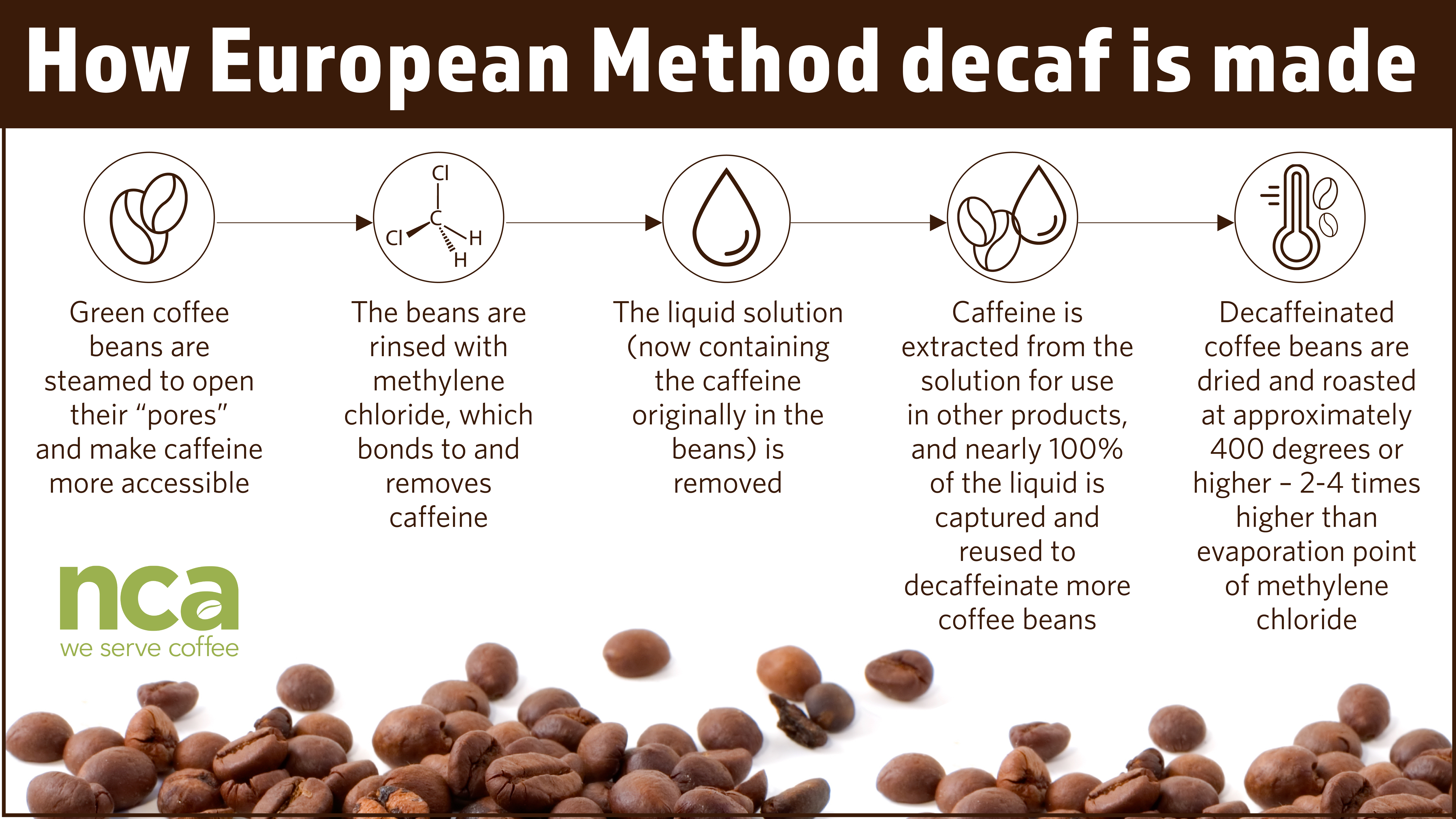Get the facts about decaffeinated coffee
Independent scientific evidence shows that drinking decaffeinated coffee, like drinking all kinds of coffee, is associated with many unique health benefits, including increased longevity and decreased risk of multiple cancers and chronic diseases.
More than 90% of American coffee drinkers choose caffeinated brews, but decaf is a great option for those who want the taste and social connections of drinking coffee without the energy boost of caffeine.
Looking for information about California and FDA’s evaluation of the safety of decaffeinated coffee? Learn why unscientific proposals by activists to ban decaf and to seek misleading warning labels should be rejected.
How is coffee decaffeinated?
Like regular coffee, decaf coffee begins as green, unroasted beans. To dissolve and remove caffeine, the hard beans are warmed and soaked in liquid in one of four ways - the most common is the European Method.

All methods of decaffeination rely on chemistry to extract caffeine naturally found in coffee beans, and all are equally safe. Once the caffeine is removed (well, at least 97+% of it), the beans are washed, steamed, and roasted at very high temperatures that evaporate all or nearly all liquid used in decaffeination.
How much caffeine is in decaf coffee?
Decaffeination removes about 97% or more of the caffeine in coffee beans. A typical cup of decaf coffee has about 2 mg of caffeine, compared to a typical cup of regular coffee, which has about 95 mg of caffeine.
Is decaf coffee safe? Is there any safety risk from the decaffeination process?
All methods of decaffeination rely on chemistry to extract caffeine naturally found in coffee beans, and all are authorized as safe by food safety regulators in the United States, Europe, and around the world. Like all coffee, decaffeinated coffee is safe for consumption and can be part of a healthy diet.
Regardless of the decaffeination process used, once the caffeine is removed (well, at least 97% of it), coffee beans are washed, steamed, and roasted at temperatures that evaporate liquids used.
For the most common decaffeinated coffee - European Method decaf - the U.S. Food and Drug Administration (FDA) has set a rigorous standard of 10 parts per million (that’s the equivalent of 10 drops of water in 10 gallons) for minute traces of methylene chloride and has said the risk to consumers from drinking European Method decaf is “essentially non-existent.”
Is decaf coffee healthy?
The overwhelming weight of independent scientific evidence shows that drinking decaffeinated coffee, like all coffee, is associated with numerous significant health benefits including increased longevity and decreased risk of multiple cancers.
One very large, well-designed study using UK Biobank data found that drinking 3 cups of any kind of coffee per day was associated with a 12% reduction in overall mortality, and the study specifies that “Similar associations were observed for instant, ground, and decaffeinated coffee…”
Numerous health authorities affirm the evidence that drinking coffee - decaffeinated and regular - is associated with significant health benefits:
● In 2016, the World Health Organization’s International Agency for Research on Cancer (IARC) put drinking coffee in its lowest risk category, determining that coffee is not likely to cause cancer and may be protective against some cancers.
● California’s state scientific agency in separate reviews concluded: “A very large number of human studies, taken together, show inadequate evidence that drinking coffee causes cancer. Drinking coffee even appears to reduce the risk of liver cancer and endometrial cancer.”
● The American Cancer Society updated in 2020 its dietary guidelines for cancer prevention and concluded that coffee reduces the risk of skin, mouth, and throat cancer and likely reduces the risk of liver and endometrial cancer.
● The American Institute for Cancer Research recommends consuming coffee “regularly.”
● The World Cancer Research Fund says “...there is strong evidence that coffee decreases the risk of liver and womb cancers. There’s also some evidence that coffee decreases the risk of mouth, pharynx and larynx, and skin cancers.”
How much caffeine is too much?
Regulators and health authorities in the United States and around the world have concluded moderate caffeine intake can be part of healthy diets for most adults -- generally up to 400mg per day, or about 4-5 cups of coffee. Guidelines may vary for people with certain medical conditions.
As you think about caffeine intake, be mindful that caffeine is found not just in coffee but also in other foods and beverages, so consider all potential sources. Every body is different, so everyone should check health recommendations from recognized authorities, listen to how their body responds to caffeine, and consult their personal physician if they have any questions.